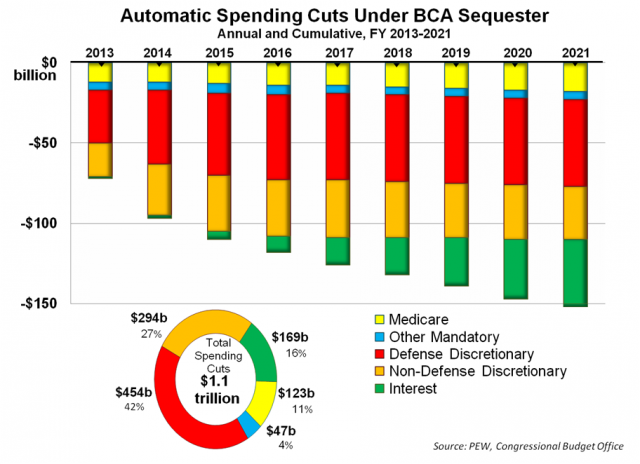Editor’s Note – People dont think that sequestration will have an affect on them, just the military, but not only does it hit jobs at the government contractor level in key states, it will affect our own civil defense. Disaster response may suffer greatly. It appears little will be done about it in the coming months either:
Members of Congress are more interested in winning re-election in November than in removing before then the budget “sequestration” knife that threatens to lop 10 percent off 2,500 defense programs starting Jan. 2.
Sequestration Hits Close to Home: Defense Support to Civil Authorities in Danger
By Noelle Doundoulakis – Heritage Foundation
The Heritage Foundation hosted its Homeland Security 2012 Conference on Wednesday. Several distinguished speakers warned that defense disaster response support to civil authorities is threatened by sequestration.
The conference contributors included the Honorable Paul N. Stockton, Assistant Secretary of Defense for Homeland Defense and Americas’ Security Affairs; Vice Admiral Harvey E. Johnson, USCG (Ret.), and Heritage’s James Carafano, Ph.D.
The importance of the Department of Defense (DOD) in disaster response was a recurring theme in their remarks. This led to an important point of agreement: The looming defense sequestration undoubtedly puts effective disaster response at risk.
Stockton stated that the DOD is working to be better positioned to support civil authorities and strengthen preparedness. He emphasized building resilience in order to be prepared for a critical infrastructure such as an electromagnetic pulse attack or cyber occurrence. It is absolutely imperative, he said, that the DOD have the ability to exercise core missions in any and all situations.
Building on these points, Vice Admiral Johnson spoke about domestic disasters that have occurred in the past years and how the Coast Guard, National Guard, and Department of Homeland Security (DHS) have been essential in both rescue and recovery. He also expressed concern about what kind of effect sequestration may have on themodernization of the Coast Guard and other branches of the military and the military’s ability to sustain critical operations.
With an already under-resourced military, defense cuts will undeniably hamper the collaboration between the DOD and DHS and curtail these organizations’ capacity to protect America’s interests.
Carafano echoed these observations and stressed the strain that sequestration would cause homeland security and military readiness. The National Guard and Coast Guard have been critical during national disasters, but sequestration will largely hollow out these components of the nation’s security.
There is no doubt that the DOD is essential to the nation’s homeland security and will continue to be a crucial part of disaster response. However, depending on how sequestration plays out, the U.S. may lose this vital branch of homeland security.
America should ensure that it can respond to a crisis at home before victory can be claimed abroad. Drastic cuts to defense will unquestionably harm the efforts of civil authorities during a crisis and will cause irreparable damage to the strength of this country.
Noelle Doundoulakis is currently a member of the Young Leaders Program at The Heritage Foundation. For more information on interning at Heritage, please visit http://www.heritage.org/about/departments/ylp.cfm.

